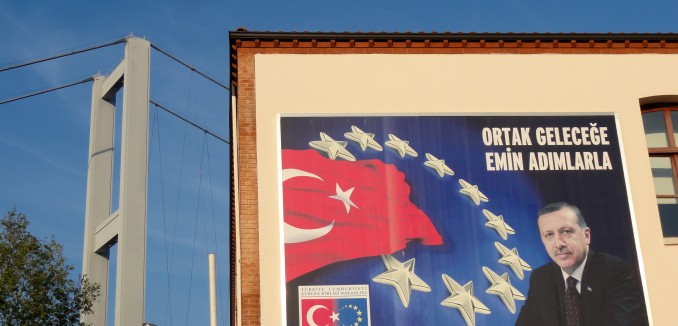“Terrorism” is not the term the Turkish government prefers to use when it refers to the groups that it supports across the Middle East. But when terrorists affiliated with these groups staged attacks in France, a key ally, Turkey rushed to condemn them and tried to parlay its support for France into momentum for its bid to become a member of the European Union (EU).
According to an analysis in the Al-Arab (Arabic link) pan-Arab newspaper:
The Islamic regime in Turkey would like to be seen as more moderate and thus refute the charges often hurled against it, according to which it helps the radical jihad organizations fighting against Syrian President Bashar al-Assad. The participation of Turkish Prime Minister Ahmet Davutoğlu in the solidarity march in Paris after the Paris terrorist attacks reflects Ankara’s desire to extricate itself from its isolation.
The newspaper added that by participating in Paris’ solidarity march, “Turkey was trying to wash its hands of terrorism.”
Turkey is suffering from increasing isolation, both at the regional and international levels, as a result of its stances on several issues in the Middle East and due to its non-participation in the war against Islamic State of Iraq and Syria (ISIS) just over its border in neighboring Syria.
The tension between the Arab states and Turkey is also due to the anger expressed by Recep Tayyip Erdoğan, now the president of Turkey, after the ousting of Mohamed Morsi and the Muslim Brotherhood from the Egyptian government in June 2013. Since Morsi’s ouster, Turkey has hurled allegations at the Egyptian government led by new President Abdel Fattah al-Sisi, branding him a dictator. The recent rapprochement between Egypt and Qatar only increased the isolation of Turkey. Until recently, Qatar and Turkey were the only open supporters of the Muslim Brotherhood in the region, and now it appears that Turkey stands alone.
But the terrorist acts that were carried out in Paris provided Turkey with a new chance to get close again to Europe. Davutoğlu called the attacks (Arabic link) “acts of terrorism,” but also attacked European countries for refusing to allow his country to join the European Union. He said that if European countries were not imposing obstacles to Turkey, cultural tensions between religions in Europe would not exist today.
Many EU countries refuse to let Turkey join the organization, largely due to endemic corruption and violation of freedoms in Turkey that violate EU standards. Turkey hopes to be able to remove this isolation. The Erdoğan government realizes that Germany plays a major role in decision-making in Europe, and so Prime Minister Davutoğlu went to Berlin after his participation in the solidarity march in Paris.
Turkey’s aspirations to join the EU were dealt a blow in light of the recent arrests of journalists and editors from newspapers affiliated with the Turkish opposition. These arrests have increased friction between Ankara and the EU. This is in addition to criticism Turkey receives for its support of Islamic extremist organizations fighting in Syria and allowing terrorists crossing from Turkey into Syria.
The participation of Turkey’s prime minister and foreign minister in the Paris solidarity march shows that the Turkish regime understands that despite being a NATO member, it is regarded with skepticism in the international arena, and is attempting to respond to its critics.
[Photo: Patrick Müller / Flickr]




